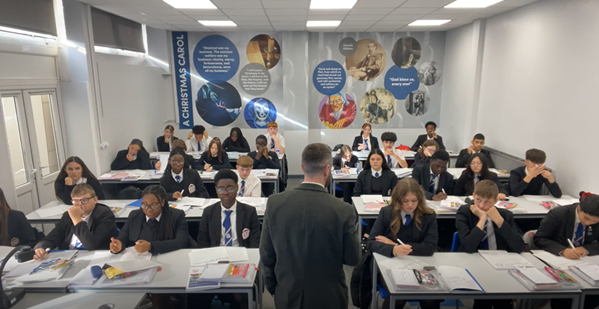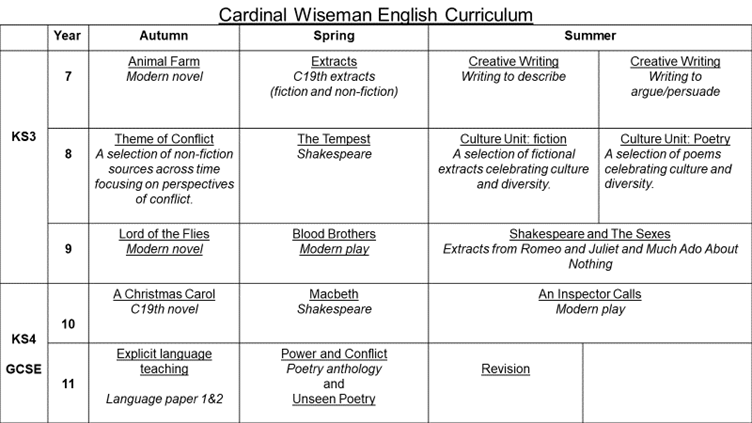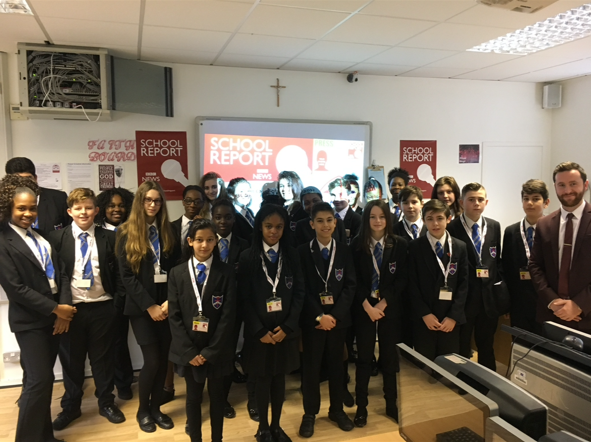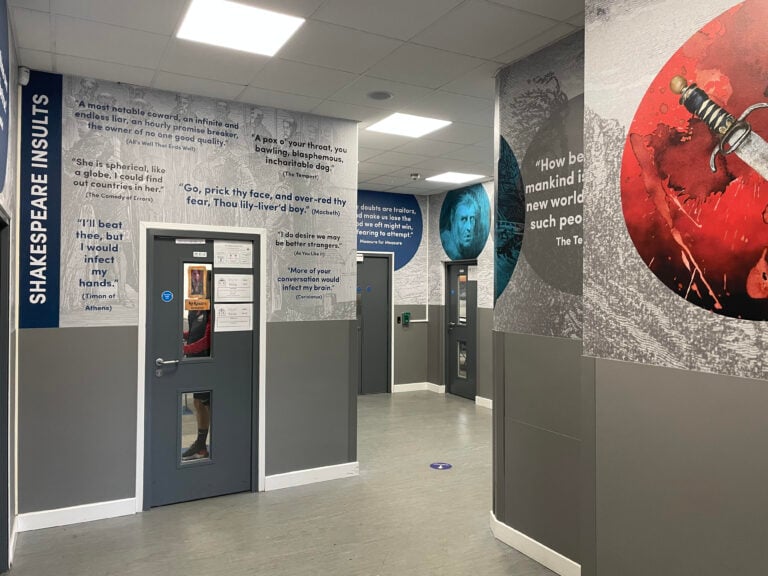What is English?
English Literature:
- Study of novels, plays, short stories, and poetry.
- Focuses on analysing themes, ideas, language, structure, historical context, and authorial intent.
- Involves critical thinking through essays and other written tasks.
English Language:
- Study of grammar, usage, and style through fiction and non-fiction texts.
- Explores comprehension, language analysis, writing styles, and the evolution of the English language (e.g., dialects and accents).
- Encourages creative writing like stories, letters, speeches, and articles/blogs.


Why is English important?
- Empowerment and Communication
English teaches students to express themselves fluently, helping them succeed in other subjects and beyond. - Cultural and Personal Development
Reading fosters emotional, intellectual, and spiritual growth while connecting students to their literary heritage. - Essential Skills for Life
Proficiency in speaking, reading, and writing ensures full participation in society and prevents marginalisation. - Encourages Exploration
English helps students appreciate a wide literary heritage, expand vocabulary, and adapt their writing to various contexts.
Purpose of English:
- High Standards in Literacy
Equipping students with strong reading, writing, and speaking skills, and fostering a love of literature. - Future Success
Providing skills for life beyond education, including collaboration, debate, and effective communication. - Identity and Empathy
Helps students explore personal identity and societal issues (e.g., race, gender, and sexuality) while challenging biases. - Cultural Capital
Reduces disadvantages linked to socioeconomic background and prepares students to succeed in life.
This holistic approach makes English not just an academic subject but a key contributor to personal growth and social participation.

What is the English curriculum at Cardinal Wiseman?
The English curriculum is carefully designed to provide students with a rich and engaging learning experience that builds progressively as they move through school. We follow a knowledge-engaged approach, ensuring that students not only acquire essential knowledge but also develop the skills to apply it in meaningful and creative ways.
Key Features of the Curriculum:
- Knowledge-Engaged Learning
Our curriculum prioritises powerful knowledge, focusing on the ideas, concepts, and skills students need to excel in English. Each unit is designed to deepen understanding and foster intellectual curiosity. - Interleaved Curriculum
The curriculum is interleaved, meaning key concepts and skills are revisited throughout the year and across different year groups. This helps students consolidate their knowledge and apply it in new and challenging contexts. - Building on Knowledge
Learning in English is carefully sequenced to build on prior knowledge. As students progress through the school, they revisit and deepen their understanding of key ideas, themes, and concepts, ensuring a strong foundation for future learning. - Thematic Links Between Texts
Texts are chosen with care to explore shared themes, enabling students to make meaningful connections between their learning. By studying literature that spans different genres, time periods, and cultures, students develop a broader understanding of key ideas and how they are explored in various ways. - Progressive Challenge
As students move through each year group, the complexity of the texts, tasks, and expectations increases. This gradual progression ensures that students are constantly challenged while building the skills they need for success at GCSE and beyond.
How Does This Benefit Students?
- Deep Understanding
Revisiting key ideas allows students to retain and expand their knowledge, leading to mastery over time. - Making Connections
Thematic links between texts encourage critical thinking and help students understand literature within a broader context. - Preparedness for GCSE
By steadily increasing the level of challenge, students are fully prepared for the demands of GCSE English Language and Literature. - Lifelong Skills
The curriculum develops transferable skills such as analysis, evaluation, and the ability to articulate ideas clearly and confidently.

What Are Knowledge Booklets?
The English department at Cardinal Wiseman is committed to providing your child with the highest quality education. To support this, we use knowledge booklets in our curriculum—an exceptional resource designed to enhance learning and ensure every student is equipped with the tools they need to succeed.
Knowledge booklets are expertly crafted by our experienced teaching staff, including examiners and subject specialists. These detailed resources are tailored to each subject and year group, containing everything your child needs to build a solid foundation of knowledge and skills.
Why Are Knowledge Booklets So Effective?
- Comprehensive Content
Each booklet is packed with powerful knowledge carefully aligned with the curriculum, ensuring that students are exposed to essential concepts and ideas in a structured and accessible way. - Engaging Tasks
The booklets include a variety of tasks and activities designed to reinforce learning, encourage independent study, and develop critical thinking skills. - Built-In Scaffolding
To support all learners, the booklets include scaffolding that helps students progress confidently, regardless of their starting point. - Teacher Expertise
Created by highly skilled teachers who understand what examiners look for, the booklets provide insights that give students a competitive edge.
How Do Knowledge Booklets Benefit Students?
- They help students organise their learning by providing a clear structure for each topic.
- They promote independent study and allow students to revisit and revise material at their own pace.
- They prepare students effectively for assessments by emphasising key concepts and exam techniques.
- They ensure consistency across the school, so every student has access to the same high-quality resources.
Extracurricular Opportunities in English
Extracurricular activities in English help students enhance creativity, critical thinking, teamwork, and confidence while engaging with the subject in meaningful ways. These opportunities empower students to grow academically and personally, preparing them for future success. Examples of extracurricular activities include:
- Debate Competitions
Develop persuasive and critical thinking skills by researching and arguing contemporary issues in local, regional, and national competitions. - Creative Writing Clubs
Explore imaginative writing through poetry, stories, and scripts, with opportunities to publish and participate in competitions. - Public Speaking Events
Refine delivery, tone, and confidence through prepared speeches, impromptu challenges, and storytelling. - Drama and Theatre Productions
Interpret scripts, act, or direct to bring literature to life while fostering teamwork and creativity. - Poetry Slams and Recitals
Share original poetry or perform spoken word to build confidence and explore rhythm and emotion. - Journalism Clubs
Write articles, conduct interviews, and develop research and editing skills for school newspapers or blogs.

Useful Information:
Key Stage 3 National Curriculum:
National curriculum in England: secondary curriculum - GOV.UK
Exam Board Information Key Stage 4:
AQA GCSE English Language (8700)
AQA GCSE English Literature (8702)



